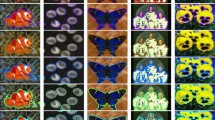Abstract
A fuzzy set theory based region merging approach is presented to tackle the issue of oversegmentation from the watershed algorithm, for achieving robust image segmentation. A novel hybrid similarity measure is proposed as the merging criterion, based on the region-based similarity and the edge-based similarity. Both similarities are obtained using the fuzzy set theory. To adaptively adjust the influential degree of each similarity to region merging, a simple but effective weighting scheme is employed with the weight varying as region merging proceeds. The proposed approach has been applied to various images, including gray-scale images and color images. Experimental results have demonstrated that the proposed approach produces quite robust segmentations.
Preview
Unable to display preview. Download preview PDF.
Similar content being viewed by others
References
Haris, K., Efstratiadis, S.N., Maglaveras, N., Katsaggelo, A.K.: Hybrid image segmentation using watersheds and fast region merging. IEEE Trans. Image Processing. 7, 1684–1699 (1998)
Navon, E., Miller, O., Averbuch, A.: Color image segmentation based on adaptive local thresholds. Image and Vision Computing 23, 69–85 (2005)
Vincent, L., Soille, P.: Watersheds in digital space: an efficient algorithm based on immersion simulations. IEEE Trans. PAMI. 13, 583–598 (1991)
Kim, J.B., Kim, H.J.: Multiresolution-based watersheds for efficient image segmentation. Pattern Recognition Letters 24, 473–488 (2003)
Zhu, H., Basir, O., Karray, F.: Fuzzy integral based region merging for watershed image segmentation. Proc. 10th IEEE Int. Conf. on Fuzzy Systems. 1, 27–30 (2001)
Chu, C., Aggarwal, J.K.: The integration of image segmentation maps using region and edge information. IEEE Trans. PAMI. 15, 1241–1252 (1993)
Canny, J.: A computational approach to edge detection. IEEE Trans. PAMI 8, 679–698 (1986)
Ballard, D., Brown, C.: Computer Vision. Prentice-Hall, Englewood Cliffs (1982)
Chen, Y., Wang, J.Z.: A region-based fuzzy feature matching approach to content-based image retrieval. IEEE Trans. PAMI. 24, 1252–1267 (2002)
Van der Weken, D., Nachtegael, M., Kerre, E.E.: Using similarity and homogeneity for the comparison of images. Image and Vision Computing 22, 695–702 (2004)
Pal, S.K., Ghosh, A.: Index of area coverage of fuzzy image subsets and object extraction. Pattern Recognition Letters 11, 831–841 (1990)
Tizhoosh, H.R.: Fuzzy Image Processing: Introduction in Theory and Practice. Springer, Heidelberg (1997)
Author information
Authors and Affiliations
Editor information
Editors and Affiliations
Rights and permissions
Copyright information
© 2005 Springer-Verlag Berlin Heidelberg
About this paper
Cite this paper
Zhu, H., Basir, O. (2005). Fuzzy Sets Theory Based Region Merging for Robust Image Segmentation. In: Wang, L., Jin, Y. (eds) Fuzzy Systems and Knowledge Discovery. FSKD 2005. Lecture Notes in Computer Science(), vol 3613. Springer, Berlin, Heidelberg. https://doi.org/10.1007/11539506_55
Download citation
DOI: https://doi.org/10.1007/11539506_55
Publisher Name: Springer, Berlin, Heidelberg
Print ISBN: 978-3-540-28312-6
Online ISBN: 978-3-540-31830-9
eBook Packages: Computer ScienceComputer Science (R0)




